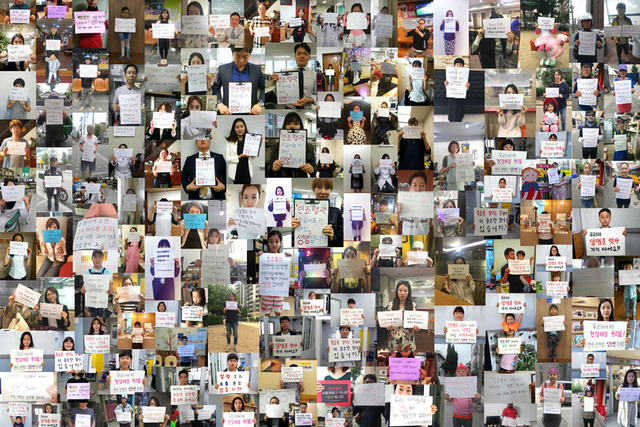 |
|
Members of the Korea Congenital Heart Disease Patient Group (CHD) began a campaign in May 2017 demanding that Gore continues to supply artificial blood vessels to the South Korean market. Gore withdrew from the South Korean market in September 2017. (provided by CHD)
|
US multinational medical equipment supplier responds to letter from S. Korean health authorities
Multinational medical equipment supplier Gore announced on Mar. 11 that it would immediately supply 20 artificial blood vessels, known as vascular grafts, which are needed for pediatric heart operations. This suggests that children with congenital heart conditions whose critical operations had been delayed indefinitely will soon be able to have their surgeries. While patient advocacy organizations and the South Korean government are welcoming this announcement, there are concerns about exactly when the supply will resume and whether that supply will include all the products needed for surgery. Gore stopped supplying artificial vascular grafts to South Korea when it shut down its medical operations in the country in September 2017. As hospitals run low on their stock of vascular grafts, they are unable to perform operations on children with heart disease. On Mar. 11, the South Korean Ministry of Health and Welfare (MOWH) and the Ministry of Food and Drug Safety (MFDS) announced that Gore had decided to immediately supply 20 vascular grafts that are critical for pediatric heart surgery. This was how Gore responded to a letter from South Korean health authorities looking to schedule a visit to Gore’s US headquarters. In regard to the question of supplying all its medical materials as it did before its withdrawal from the market, Gore said it hopes to resolve the problem by holding dialogue with Seoul as early as possible. “It will probably take between one week and 10 days for the initial 20 units to arrive. We’re going to be discussing the resumption of supplies in a meeting with Gore in the US as early as this week. That will go forward once we receive all the documentation we’ve requested from the medical establishment,” said an MFDS official. “We decided to terminate our medical equipment operations in the Korean market in 2017. Since then, we have received requests from the families of patients, medical organizations and government officials to reconsider that decision,” Gore said in an official position statement that was released on Monday afternoon. “We are giving positive consideration to the possibility of resuming a limited supply of medical equipment that is only supplied by Gore and that is regarded as medically essential or that has no substitutes in the Korean market,” Gore said. But the company didn’t specify exactly when it would resume supplying vascular grafts, nor did it mention why it withdrew from the Korean market in 2017. Disagreements over which products are necessary to S. Korean market Gore also said that it’s in deliberations with doctors, patient advocacy groups and government officials in order to determine the kinds and amounts of vascular grafts that are necessary for pediatric heart surgeries and so that it can meet South Korea’s regulatory requirements for reopening its supply of these products. There’s a disagreement between Gore and South Korean patient advocacy groups and doctors about which products are really necessary for Gore to supply. According to Gore, some of the products requested by South Korean groups can be purchased from other manufacturers. The South Korean government and patient advocacy groups have welcomed Gore’s decision, but are also pursuing discussions to ensure that the kinds and volume of vascular grafts that are supplied will be adequate for medical operations. As a point of reference, 50 of the vascular grafts whose supply has nearly been exhausted were used in Korean hospitals in 2016. “This is good news as we prepare to launch our main discussions with Gore’s headquarters in the US,” said an official with the Ministry of Health and Welfare. “During a telephone call this past weekend, Gore indicated that it would be supplying the vascular grafts that are immediately needed for heart surgeries. I think this is going to solve the issue of children who aren’t able to receive operations because of a lack of the vascular grafts in question,” said Ahn Sang-ho, the head of an online community for Koreans with congenital heart conditions. “Since the specific timing of the supply hasn’t been confirmed yet, we’re also discussing that. And since there’s a disagreement between Gore and the domestic medical community about which kinds of vascular grafts are necessary, we’re also asking Gore to supply all its vascular grafts as it did prior to its withdrawal in 2017.” Move to address corporate monopolies on medical supplies at WHO session While announcing the MOHW’s business plan for 2019 on Monday, Health Minister Park Neung-hoo said that Seoul was planning to tackle the issue of multinational companies like Gore that have a monopoly on the production and supply of rare medical products and materials by formally adding this to the agenda of the May session of the World Health Organization (WHO). This suggests that the government intends to find an international solution to its conflict with multinational medical firms about reviewing products, permitting their sale and setting prices. “Multinational pharmaceutical firms and medical equipment producers engage in several kinds of monopolistic and domineering behaviors for their proprietary products. Since individual countries usually aren’t strong enough to address such monopolistic situations, it’s necessary for us to take joint action with other governments,” Park said. By Kim Yang-joong and Hwang Ye-rang, staff reporters Please direct comments or questions to [english@hani.co.kr]






